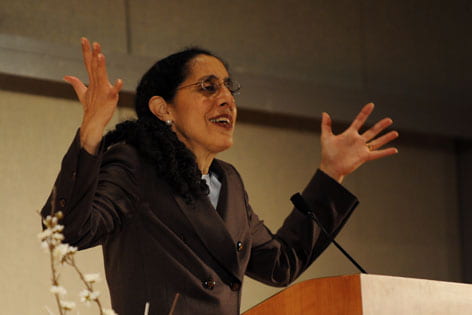Civil rights pioneer addresses UCI community
Civil rights attorney Lani Guinier calls for continued work toward a more just and equal society in MLK week speech at UC Irvine.

A lecture by Lani Guinier, the first tenured black female professor at Harvard Law School, capped a four-day celebration of Martin Luther King Jr.’s life on the UC Irvine campus.
Guinier appeared at the UCI Student Center Thursday evening to share her thoughts on the nation’s progress since the days of slavery and segregation, while acknowledging that work to create a more just and equal society remains to be done.
Guinier’s delivery of the Joseph L. White lecture stressed the importance of embracing diversity and creating a culture that values collaborative problem solving.
“We can’t solve the most complex problems of the 21st century with individualistic learners,” Guinier said. “We have great problems to solve and we’re going to have to solve them together.”
Years before she joined the Harvard faculty Guinier was nominated by President Clinton to head the Department of Justice Civil Rights Division. Her views on affirmative action, gender equity and racial districting of voters alienated key legislators, who convinced Clinton to withdraw her nomination.
Guinier did not address the ordeal during her lecture, but Joseph L. White alluded to it during his opening remarks.
White, for whom the lecture is named, introduced Guinier by finding a commonality between her career and that of Martin Luther King Jr. and Barack Obama.
“I thought of a theme that unites all three of these beautiful people,” White said. “Resilience: the ability to bounce back from a setback and grow stronger in the broken places.”
Central to Guinier’s discussion is how minority groups’ struggles reflect deficiencies within the larger society.
“Talent is distributed equally among all groups,” she said. “If some in the groups are not thriving, this signals that something is wrong with the environment in which we are raising all of our children.”
Guinier illustrated this idea with an example from academia; black students at a Texas university were scoring well below Chinese students on calculus tests. Their professor observed that black students prepared for tests by studying alone, and their Chinese peers studied in groups, participating in lively discussions and debates.
Guinier said that by changing black students’ test preparation skills, the professor measured a significant increase in their scores.
“The problem was not the students, the problem was the teaching method,” she said.